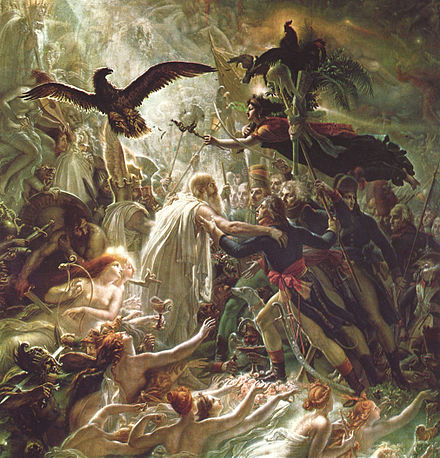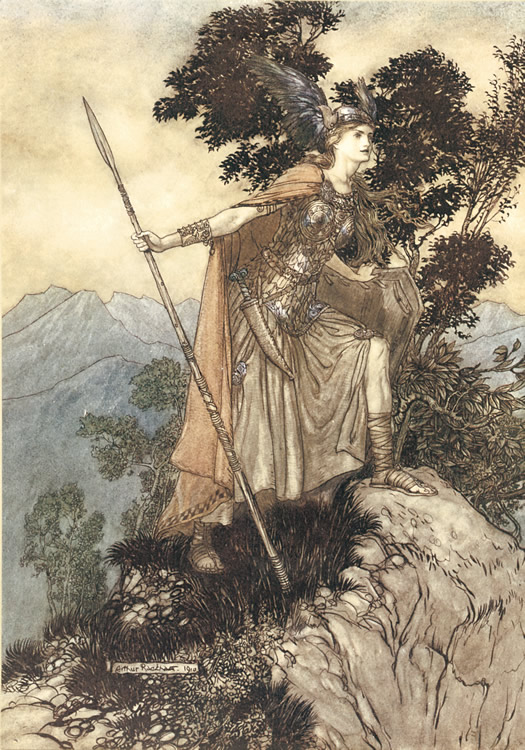“The Spear of Destiny” is considered to
be a classic of occultism and alternative history (think “The Da Vinci Code” or
similar). The book surprised me on a number of levels. First, it's extremely
well written. Large portions of it read like a novel. Second, it's explicitly
Anthroposophical. I had expected the book to be occultist or alt-historical on
a more general level. It's probably the subject matter (Hitler's early years
and his connections to the dark arts) that has made Ravenscroft's exegesis of
Rudolf Steiner and Walter Stein so popular. Otherwise, Anthroposophy strikes me
as a very narrow subject!
The British national Trevor Ravenscroft served during
World War II and was taken prisoner by the Nazis during a botched attempt to
assassinate the German Field Marshal Erwin Rommel in North Africa. Others say
he was taken captive during an earlier reconnaissance mission. After the war,
Ravenscroft became a reporter and a serious student of esotericism. In the
latter capacity, he met Walter Stein, a prominent German Anthroposophist
residing in Britain since 1933 (Stein had to flee Germany due to his Jewish
ancestry). Stein told Ravenscroft about his meetings with a young Hitler in
Austria before World War I, and revealed that the future Führer was a black
magician obsessed with the Spear of Destiny, a Catholic relic kept in the
imperial palace in Vienna as part of the Habsburg crown jewels. “The Spear of
Destiny”, published after Stein's death, is thus based on Stein's recollections
of Hitler. Naturally, skeptics are not amused and usually charge Ravenscroft
with having invented the whole story by himself. According to this scenario,
the author never really met Stein at all! An interesting question is whether
the Anthroposophists accept Ravenscroft's version of events and what status, if
any, “The Spear of Destiny” has in their canon?
As for the book itself, it expounds on two interrelated
themes. First, Stein's sensational claims about having befriended Hitler in
Vienna during the latter's most down-and-out period. Hitler experimented with
mescaline to achieve occult clairvoyance, understood the esoteric meaning of
Wolfram von Eschenbach's medieval romance “Parzival” and Richard Wagner's opera
“Parsifal”, and had contacts with black magicians around the notorious Guido
von List. Depraved sex magic á la Aleister Crowley was also very much part of
the picture. Above all, Hitler knew the secret of the Spear of Destiny, the
previously mentioned relic kept in the Hofburg. Also known as the Spear of
Longinus or the Holy Lance, during the Middle Ages this spearhead was believed
to come from the lance of the Roman soldier who pierced the side of Jesus at
the crucifixion. It was used in coronation ceremonies of German emperors.
Hitler supposedly knew that the spear could be used for both good and evil, and
that an evil magician gaining possession of it could literally conquer and rule
the world. Stein told Ravenscroft that Hitler became literally possessed by
Lucifer when standing in front of the glass casket where the spear is kept,
completely entranced by it. Stein also had dramatic visions himself when
visiting the Hofburg and looking at the spear. Furthermore, Stein claimed that
Hitler had learned his earlier incarnation through occult means: the future
Nazi leader had been Landulf II, a 10th century Lombard prince who Ravenscroft
identifies with Klingsor, the evil magician in “Parzival” and “Parsifal”.
The second theme of the book is an Anthroposophical
exegesis of the esoteric significance of the Spear of Destiny, the Holy Grail,
various characters in “Parzival” and “Parsifal”, and also of 20th century
German history. This explains the peculiar fact that Ravenscroft is somewhat
more positive to World War I Germany than to World War II ditto, since Rudolf
Steiner (the founder of Anthroposophy) supported the Central Powers during the
first war. Steiner even had a connection to German general Helmuth von Moltke!
Otherwise, I suppose Ravenscroft follows Stein's writings on the Grail quest
and the Arthurian romances (which I haven't read). The seemingly peculiar
preoccupation with the Spear of Longinus seems to be connected to Steiner's
idea that the blood of Christ shed on the cross had occult properties of
significance to earthly evolution. Indeed, I get the impression that
Ravenscroft paints Nazism as a kind of conscious counter-Anthroposophy, since Hitler
is said to have studied exactly the same texts as Steiner and Stein. The author
claims that the Nazis tried to assassinate Steiner at least twice, and that the
mysterious fire which destroyed Steiner's mystery temple “Goetheanum” in
Switzerland was a Nazi arson attack specifically intended to destroy Steiner's
sculpture of Christ's victory over Lucifer and Ahriman, a sculpture the author
apparently believes has occult properties. Further, Ravenscroft claims that SS
Reichsführer Heinrich Himmler was the “Anti-Man” and the “Doppelgänger”, two
other Anthroposophical concepts. As a side show, he speculates that U.S.
general Patton was an esotericist with a strong interest in the Holy Lance.
As already mentioned, Ravenscroft's book has been
strongly questioned, even condemned, and the author himself painted as a
half-crazed charlatan. I think virtually all scholars deny that Hitler had any
esoteric interests – indeed, he attacks the Völkisch Neo-Pagans in the pages of
“Mein Kampf”. Himmler, by contrast, was interested in occultism, so an occult
strain in Nazism certainly exists. (Ever noticed the occult symbol on the Nazi
flag? Hiding in plain sight, or what?) There is also Rudolf Hess, who according
to some sources was interested in…Anthroposophy! As for “The Spear of Destiny”,
it could be read as creative fiction, as Anthroposophical exegesis or even as
clairvoyant truth, depending on your state of mind. Or mind-expansion.











